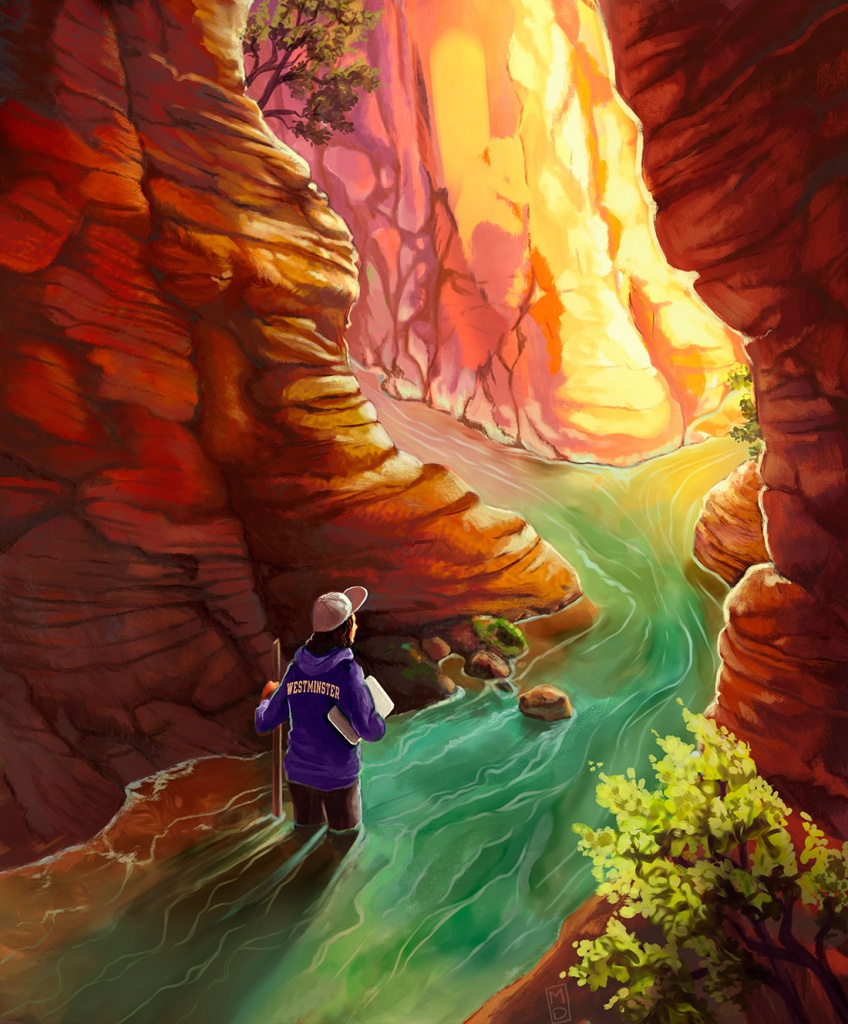
Find Your Path

Westminster’s new curriculum allows students to discover passions through general
requirements
by Arikka Von (MSC ’15)
When hiking upstream in a narrow slot canyon, each step is a gamble, and there is
no obvious best path. Will your boots slip on the smooth rocks under the current you
are fighting? Will your poles sink in the silt bottom of the cold Virgin River? Will
you be awestruck by the stunning red-rock walls towering a thousand feet above your
head?
Yes, on all counts.
Through Westminster’s new, customized liberal arts curriculum, WCore, all Westminster
undergraduates now have the option to discover their own best path. It may include
leaving the Narrows of Zion National Park with sore muscles, vivid memories, and core
liberal education credits in history and geology: America’s Best Idea and National
Parks Geology are just two of the 80 new courses designed to excite students and stimulate
curiosity in WCore.
WCore replaces what many alums remember as Liberal Education (LE). Forget snoozing
through Math 105 or Introduction to Psychology. Beginning Fall 2016, students have
innovative choices like Counting Votes, a look at US voting methodology that puts
mathematics to use in new ways, or Bust that Psych Myth, which exposes legends such
as the power of hypnosis.
Faculty designed WCore to fulfill general-education requirements with classes that
are anything but basic. Students will dig deep by tackling real-world situations in
classes like these:
• Vampire Literature
• How We Die in America
• Counting Votes
• Science of Food and Drink
• People, Power, and Protest
• Drawing Lines in the Sand
The overhaul started when the college evaluated its current LE curriculum. Faculty
identified the best parts of the old system, investigated national trends, and developed
a custom program for Westminster that breaks the mold of traditional higher-education
models.
“When we started designing WCore, we wanted to get past the stereotype many colleges
face of students coming in and saying, ‘Okay, what classes do I have to get out of
the way?’” says Barb Smith, WCore committee chair and psychology professor at Westminster.
“We said, ‘Let’s break away from tradition and do something really different.’”
Instead of a conventional framework of 16 or more categories, Westminster realized
it could meet accreditation requirements without following strict and cumbersome guidelines.
Beginning Fall 2016, Westminster students will take six total WCore classes, fulfill
four emphases, and complete an Engaging the World requirement. They will finish WCore
with a senior capstone project and showcase. Students will still need 124 hours to
graduate, but WCore has fewer credit-hour requirements than the old LE system. The
streamlined design provides more time in a student’s schedule for major courses, a
minor, and/or electives. Giving students flexibility and choice is something some
professors struggled with.
“The crusty old part of me says, ‘They’re 18 years old; they don’t know what they
want to know,’” says Jeff Nichols, history professor at Westminster. “I love the serendipity
of students saying, ‘I have to take an anthropology course. I don’t see why.’ But
then they get into it, and it’s amazing, and they love it.” Jeff has been teaching
history at Westminster for 21 years and has seen the value in exposing young minds
to ideas they’ve been reluctant to pursue on their own. While he welcomes the more
efficient framework, Jeff anticipates WCore will challenge professors and students
in other ways. “It’s going to require grumpy old farts like me to think harder and
be more creative,” he says. “I’m confident we can all do it.”
Jeff is excited about the lack of generalities in this new general-education system.
WCore classes are designed around intriguing topics that provide students with the
foundation of a valuable education. His course, America’s Best Idea, is one course
in a learning community with geology professor Tiffany Rivera’s National Parks
Geology. The same cohort of students will take both classes, then visit Zion National
Park. With Jeff, students will question whether national parks were really our best
idea—maybe democracy was a tad better?
Tiffany will challenge them to examine the varied geology within national parks that
tells a story of the evolution of North America—from mountain building, to historic
inland seas, to giant beasts of an earlier geologic age. “There are wonderfully complicated
stories within the national parks that lead to so many other topics,” Jeff says. “I
like when you get into specific stories about real people, places, and events.”
WCore is also an opportunity for professors to teach curriculum they are very passionate
and knowledgeable about. “Once we stripped away the traditional expectations of a
general-education system, we asked, ‘What, as a liberal arts institution, do we want
a student to take away from a class?’” says Barb, WCore committee chair. “It’s really
liberating as a professor. We know and are passionate about our disciplines. We should
teach what we’re passionate about.”
WCore is completely different from the old LE system in its framework and class models:
these are definitely uncharted waters that will have both faculty and students awestruck
and carefully navigating upstream. “We were overdue for change,” Jeff says. “The old
model was pretty traditional, pretty staid, at least in its framework—the LE classes
were always of great value—so this is exciting.
About the Westminster Review
The Westminster Review is Westminster University’s bi-annual alumni magazine that is distributed to alumni and community members. Each issue aims to keep alumni updated on campus current events and highlights the accomplishments of current students, professors, and Westminster alum.
GET THE REVIEW IN PRINT STAY IN TOUCH SUBMIT YOUR STORY IDEA READ MORE WESTMINSTER STORIES